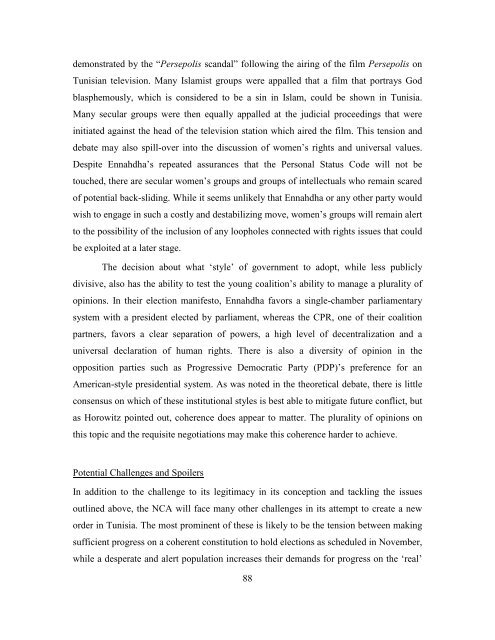Tunisia: Understanding Conflict 2012 - Johns Hopkins School of ...
Tunisia: Understanding Conflict 2012 - Johns Hopkins School of ...
Tunisia: Understanding Conflict 2012 - Johns Hopkins School of ...
You also want an ePaper? Increase the reach of your titles
YUMPU automatically turns print PDFs into web optimized ePapers that Google loves.
demonstrated by the “Persepolis scandal” following the airing <strong>of</strong> the film Persepolis on<br />
<strong>Tunisia</strong>n television. Many Islamist groups were appalled that a film that portrays God<br />
blasphemously, which is considered to be a sin in Islam, could be shown in <strong>Tunisia</strong>.<br />
Many secular groups were then equally appalled at the judicial proceedings that were<br />
initiated against the head <strong>of</strong> the television station which aired the film. This tension and<br />
debate may also spill-over into the discussion <strong>of</strong> women’s rights and universal values.<br />
Despite Ennahdha’s repeated assurances that the Personal Status Code will not be<br />
touched, there are secular women’s groups and groups <strong>of</strong> intellectuals who remain scared<br />
<strong>of</strong> potential back-sliding. While it seems unlikely that Ennahdha or any other party would<br />
wish to engage in such a costly and destabilizing move, women’s groups will remain alert<br />
to the possibility <strong>of</strong> the inclusion <strong>of</strong> any loopholes connected with rights issues that could<br />
be exploited at a later stage.<br />
The decision about what ‘style’ <strong>of</strong> government to adopt, while less publicly<br />
divisive, also has the ability to test the young coalition’s ability to manage a plurality <strong>of</strong><br />
opinions. In their election manifesto, Ennahdha favors a single-chamber parliamentary<br />
system with a president elected by parliament, whereas the CPR, one <strong>of</strong> their coalition<br />
partners, favors a clear separation <strong>of</strong> powers, a high level <strong>of</strong> decentralization and a<br />
universal declaration <strong>of</strong> human rights. There is also a diversity <strong>of</strong> opinion in the<br />
opposition parties such as Progressive Democratic Party (PDP)’s preference for an<br />
American-style presidential system. As was noted in the theoretical debate, there is little<br />
consensus on which <strong>of</strong> these institutional styles is best able to mitigate future conflict, but<br />
as Horowitz pointed out, coherence does appear to matter. The plurality <strong>of</strong> opinions on<br />
this topic and the requisite negotiations may make this coherence harder to achieve.<br />
Potential Challenges and Spoilers<br />
In addition to the challenge to its legitimacy in its conception and tackling the issues<br />
outlined above, the NCA will face many other challenges in its attempt to create a new<br />
order in <strong>Tunisia</strong>. The most prominent <strong>of</strong> these is likely to be the tension between making<br />
sufficient progress on a coherent constitution to hold elections as scheduled in November,<br />
while a desperate and alert population increases their demands for progress on the ‘real’<br />
88
















